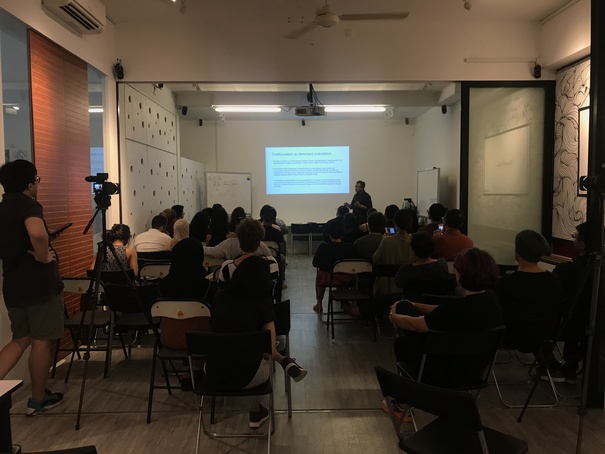-
Advocacy Theme
-
Tags
- Abortion
- Adoption
- Caregiving
- CEDAW
- Disability
- Domestic Violence
- Domestic Workers
- Harassment
- Healthcare
- Housing
- International/Regional Work
- Maintenance
- Media
- Migrant Spouses
- Migrant Workers
- Muslim Law
- National budget
- Parental Leave
- Parenthood
- Polygamy
- Population
- Race and religion
- Sexual Violence
- Sexuality Education
- Single Parents
- Social Support
- Sterilisation
- Women's Charter
Malay Religious Conservatism: A Talk
October 5th, 2017 | Events, Muslim Women's Rights, News

The emergence of Malay religious conservatism has profound implications for the lives of Malay-Muslims in the region. Rising conservatism has made its way into many segments of social life, from the policing of women’s dressing in sports to seemingly innocuous dog-petting events. Some observations about this growing trend were made during a recent talk at AWARE by Mohamed Imran, an inter-religious activist and researcher.
The talk held on 16 September 2017 was organized by Gender Equality Is Our Culture (GEC), a project of AWARE. More than 40 people attended the session, which emphasised the importance of understanding modern religious beliefs through long-term historical discourse.
Imran explained that religious conservatism can be defined as “a mode of thinking that manifests itself into social expression, practices, responses and absences”. Religious conservatism also possesses various characteristics, including the preservation of an imagined social order due to the perceived threat to one’s own existence. The language of conservatism is mostly rooted in fear, repression and control.
One distinct characteristic of Malay religious conservatism is its predominantly traditionalist roots. Traditionalism is the uncritical insistence on clinging to past formulations, customs and rituals rooted in the idea of the perfection of the past.
The historical arrival of Islam to this region was facilitated by trade, where traders spread a form of Islam that had already been codified from the Middle East. The intellectual discourse prior and leading to this codification was not reflected in the form of Islam that was brought here.
The transmission of Islamic ideas also operated within the framework of traditionalism. In such a framework, knowledge is derived from “dogmatic assertion”, where pre-existing beliefs are justified through tradition. In this manner, ideologies put forth by conservatism rely on the past to develop legitimacy in the present.
Therefore, concepts like gender equality are difficult for religious conservatives to grapple with because in-depth discussions on it are not particularly prominent in historical texts and interpretations. This is perhaps why gender equality is perceived as incompatible with “traditional” religious principles.
However, many classical and contemporary Islamic scholars have argued that spaces for gender justice and equality can, indeed, be created within an Islamic framework. Therefore, in accounting for why gender equality is not perceived to be a legitimate pursuit, one has to include the possibility that religious conservatives may also be rather selective of historical evidence.
More importantly, Imran stressed the importance of situating certain ideologies in the modern postcolonial context. Colonialism caused a dent in the Muslim psyche that continues to retreat into defensive postures against change seemingly imposed from the outside. For example, gender equality is seen as “Western” and therefore to be rejected, because Islam has its own exceptional position. At the same time, it is also the colonial legacy – the rise of religious bureaucracies with coercive powers over religious life – at the root of today’s contestation.
In the case of Malay religious conservatism, culture is another factor that needs to be considered. While culture is not monolithic and it is constantly evolving, a fossilised view of culture predominates, due to identity politics.
Answering a question from a participant about whether one’s Malay culture and identity can be detached from the Islamic faith, Imran answered,
“No religion can exist devoid of any culture. In fact, if you were to strictly demarcate that, you will find extremism on ready grounds. Because the person who has been totally decontextualised and has no notion of his cultural heritage… and has no understanding of his position in the whole political trajectory, he or she will be more open to be radicalised.”
Indeed, culture and history play important roles in shaping Malay identity. Imran brought up Malay-Muslims’ lack of affinity with the Srivijaya and Majapahit empires, two grand but somewhat forgotten Malay civilisations, noting how the Malay identity is disproportionately tied to Islam. Though these empires were not spheres of Islamic influence (they were, in fact, predominantly Buddhist and Hindu empires), they are a significant part of the Malay civilisation.
Therefore, understanding multiple layers of Malay historical identity is key to uncovering what is useful from tradition and how it has and can evolve in the changing context of today’s reality and experiences, including in matters of gender relations. If we understand the historical process, we will not think that things are determined by fate: they are the products of dominant ideas, types of elites and institutions, and power relations in society. In short, a new mode of understanding and practice can emerge if we take hold of the process of change in the present. More importantly, we need not fear change in itself and conservatism need not be the default position.
Imran then ended the talk with a rather apt quote by Islamic scholar Fazlur Rahman, who said, “It is of the greatest importance to determine exactly where society is at present before deciding where it can go. To talk about reforming society without scientifically determining where the society is, is certainly like a doctor treating a patient without taking his case history or examining him.”



